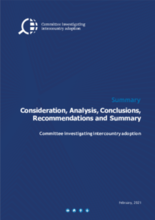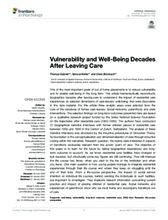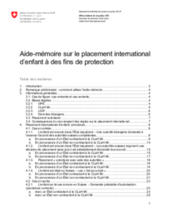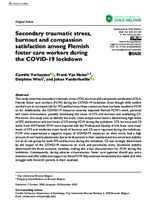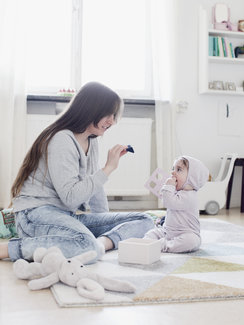

Displaying 61 - 70 of 423
This report presents the results of an independent investigation into abuses in intercountry adoption in the Netherlands during the period 1967-1998, and the role of the Dutch government in this regard.
This article hermeneutically reconstructs biographies decades after leaving-care to understand the impact of residential care experiences on selected dimensions of care-leavers’ well-being, that were discovered in the data material.
The aim of this study was to examine whether 1) attachment to the biological parents mediates the association between abuse and suicidal risk (SR) and 2) attachment to a foster parent (whether from a foster home or an institution) moderates the effect of attachment to biological parents on SR.
The aim of the current paper is to examine the demographic, crime-related and psychosocial characteristics of child welfare and juvenile justice youths in shared residential care and subsequently examine its relationship with offending behavior in adulthood.
This study uses data from a survey on the health and development of 420 children mostly under the age of three, placed in 12 infant care institutions between 1958 and 1961 in Zurich, Switzerland. The children exhibited significant delays in cognitive, social, and motor development in the first years of life. Moreover, a follow-up of a subsample of 143 children about 10 years later revealed persistent difficulties, including depression, school related-problems, and stereotypes.
The authors of this study examined caregivers’ mind-mindedness (their ability to adequately interpret their foster child’s internal mental states and behavior) in out-of-home care in the Netherlands, and the association among caregivers’ mind-mindedness (and its positive, neutral, and negative valence), recognition of the child’s trauma symptoms, and behavior problems.
Cet aide-mémoire énonce le rôle des autorités compétentes (administratives ou judiciaires) et les fonctions qui leur sont dévolues selon les bases légales applicables en matière de placement international d’enfants à des fins de protection.
The authors of this study examined attitudes about child maltreatment in China and the Netherlands.
This study investigates the extent and causes of child abandonment and various practices and services in relation to prevention of child abandonment in Denmark and other high-income countries.
This study examines secondary traumatic stress (STS), burnout and compassion satisfaction (CS) in Flemish foster care workers (FCW) during the COVID-19 lockdown.

